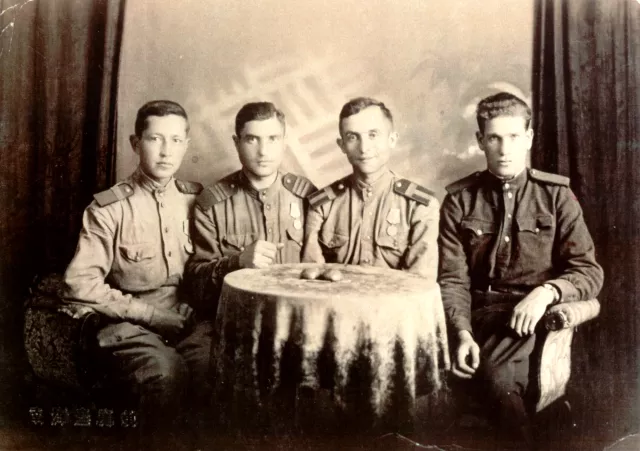Thsi is me, Israel Gliazer, second from left, photographed with my friends during our stay in Pyongyang at the end of World War II. Standing beside me on the right is my Jewish fellow comrade Kon. He moved to Israel after the war. I have a medal 'For Combat Merits' on my chest. We are wearing uniforms of the Soviet army at the time of World War II.
In early 1940 I was recruited to the Soviet army. In late 1942 I was assigned to be chief of radio station in an aerodrome in the rear of the 4th Ukrainian Front. Our unit was based near Kherson and Nikolaev in the south of Ukraine. We were following our troops advancing to the west. We lodged in barracks or dugout huts in the woods. We got along well and supported each other. We got sufficient food especially that every day our fellow comrades perished and we shared their food. Every day we received 100 grams of alcohol and we drank them in commemoration of those that perished. Our fellow comrades perished during their combat flights or during frequent air raids. In late 1943 some female radio operators arrived at our unit. I must say we cared about them. I cannot remember that they got hurt. Even if such things happened the girls' fellow comrades taught abusers how to behave. My fellow comrades were of different nationalities. We got along very well. Nobody cared about nationality issues. People were valued for their human merits. There were demonstrations of open anti-Semitism, however.
I joined Komsomol in the army and prepared my application to the Party for submittal. However, they didn’t admit my application since I was an ‘untrustworthy element’ from the point of view of my commandment. It was a standard attitude to residents of the areas that were recently annexed to the USSR. Several times my fellow comrades submitted requests for my promotion, but again they refused for this same reason.
I felt particularly bitter to hear this kind of things since I'd already heard about brutalities of fascists on occupied territories. I didn't have any information about my family. I didn't lose hope, but I understood that the worst things could happen to them. At the end of the war in spring 1945 our regiment was relocated to the vicinity of Vladivostok in the Far East. When military action against Japan began our unit within the structure of a division was relocated to the Korean port of Chongjin. A Japanese military school and two divisions were in defense of the town. Shortly after we occupied the port Japan capitulated. I was assigned to headquarters of 25th army in Pyongyang. I issued an army newspaper Krasnoye Znamia (Red banner) there. They were trying to convince me to take up a military career, but I refused.
Firstly, when I was in Vladivostok in 1945 I met a girl of my age. Her name was Ludmila Orlova. I fell in love with her. She came from a Russian family in Tambov. After finishing Moscow Pedagogical College she got a mandatory job assignment and went to work as a Russian teacher in Vladivostok. Ludmila was pregnant. I wasn't quite ready to live my life with her, but I understood that I had to marry her. Besides, I was eager to go home and find out what happened to my family. In late 1946 our son Yuri was born in Vladivostok and shortly afterward I was demobilized. We went to Tambov where we got married. We had a civil ceremony and stayed few weeks with Ludmila's parents. Her parents were religious and belonged to the sect of molokans. They were very decent people. They welcomed me and invited us to stay and live in Tambov, but of course, I couldn't wait to go back to Western Ukraine. I left for Pogdaytsy and my wife and child stayed there hoping that I would come back or find a job and come back to take them to our new home.













